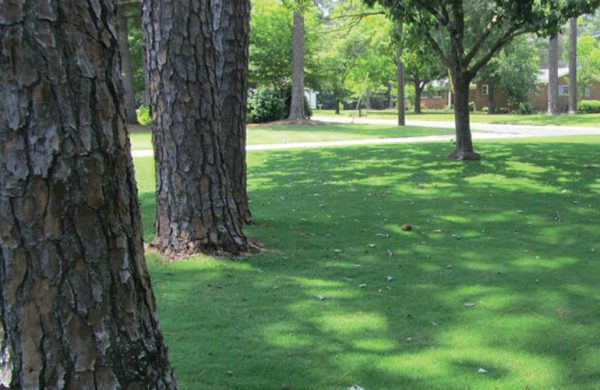Will Bermuda Grass Grow in Shade?
Even though Bermuda grass is one of the easiest plants to grow, it might be hard to get it to grow in the shade. Bermuda is not a grass that does well in shade. Bermuda grass might not grow well or at all if there are trees or buildings in your yard that block the sun.
Bermuda grass can grow a beautiful lawn, but it needs at least six hours of sunshine each day. How do you grow Bermuda grass when it’s not sunny?
Even though Bermuda grass is known for being one of the toughest grasses to grow, it doesn’t do well in the shade. Most of the time, it needs hours of sunlight. It starts to thin if it doesn’t get enough sun.
In the shade, only hybrid Bermuda grass can grow without being hurt. The grass is grown in a lab, which gives it traits that wild grass doesn’t have. So, if you want to learn how to make this grass grow well in shade, you need to find a hybrid or better version of it.


Is Bermuda Grass Shade Tolerant?
Bermuda grass can definitely grow in a lot of different places. It will grow too big to handle and go beyond your lawn. The line is drawn under the shade. The grass doesn’t do well in the shade, which makes the field not very good.
Factors Affecting Bermuda Grass Shade Tolerance
These things make it harder for Bermuda grass to grow in the shade because they lower its tolerance for shade.
Genetics And Variety
Changing genes is an important part of studying how genes work. Researchers in the field of grass breeding have learned how to make Bermuda grass and other types of grass better. Changing the genes of Bermuda grass makes it better at growing in shade.
Soil And Nutrient Conditions
The pH of the soil should be between 6 and 7 for Bermuda grass to grow well. It can also grow in slightly acidic soil. Nitrogen, potassium, and phosphorus are three important nutrients that the grass needs. These chemicals can be found in most soils.
Light Intensity And Duration
It does best where it gets direct sunlight and doesn’t get too wet. For regular Bermuda grass to grow well, it needs at least 6 hours of direct sunshine. Because it grows best in warm weather, the grass does well in the southern United States.
Temperature And Humidity
Bermuda grass usually stays between 95° and 100°F during the day. It is important for the roots, stolons, and rhizomes to grow in earth that is warmer than 65°F.
Competition From Other Plants
Bermuda grass is a species that likes to compete. Making a cover over its competitors, it chokes them. In more than 80 countries, the grass is so common that it is called a weed. It’s also not easy to get rid of Bermuda grass.
How Do I Grow Bermuda Grass In Shade?
It can be hard to grow grass under a roof or shade. Even if it gets enough water, it will still look thin and patchy. If you want to grow Bermuda grass in the shade, read these tips.
Choose A Shade-Tolerant Variety Of Bermuda Grass
It’s possible to get Bermuda grass in different shades. It grows well in shady places and has thin leaves. It has finer leaves and more of them to help it take in less sunlight. You should pick this type if you want to grow it in the shade.
Prepare The Soil With Proper Drainage And Nutrients
Even though Bermuda grass does well in dry, sandy soil, you should make sure the soil has good drainage and nutrients before putting the seeds. To help plants grow in a healthy way, make sure you use the right fertilizer.
Prune Or Remove Nearby Trees And Shrubs That Block Sunlight
You can choose to shape the trees or cut some of them down based on their height and how wide their branches are. The second option should only be used as a last measure; we suggest pruning instead. This will help the sunshine get through better.
Use reflective mulch to make more light bounce off of things and lower heat stress.
Using reflective dirt on your Bermuda grass will help it reflect more light and handle the heat better. The light from this gives your plant the energy it needs to grow.
Pest And Disease Control
To keep your Bermuda grass healthy, you should get rid of bugs and other pests. Bugs and grass mites eat the leaves and roots. Bugs like grub works, cutworms, armyworms, billbugs, fire ants, and Bermuda grass mites are most likely to eat your grass.
Aeration And Over-seeding
By letting air into the Bermuda grass once or twice a year, you can help the roots get healthier. The roots are good because they help the grass take in water and nutrients. It’s good to fill in the deep holes in your Bermuda grass with new grass after aerating it. Adding more seeds will help your Bermuda grass stay thick, green, and healthy.
Conclusion
Eventually, Bermuda grass, which is known for its strong growth, might have trouble in shaded areas because it likes sunshine. Still, you can get good at Bermuda grass shade tolerance by choosing hybrid types that are specifically made to handle shade. For the best growth, it’s important to think about a lot of different things and use good tactics.
FAQs
Is Bermuda Grass Shade-Tolerant?
Bermuda grass doesn’t usually do well in shade. For best growth, it needs a lot of sunshine, usually about six hours a day. But there are hybrid varieties that were especially bred to do well in shade.
What Factors Affect Bermuda Grass Shade Tolerance?
Genetics and variety, soil and nutrient conditions, light intensity and length, temperature and humidity, and competition from other plants are some of the things that affect how well Bermuda grass can handle shade.
How Can I Grow Bermuda Grass In The Shade?
To grow Bermuda grass in the shade, you should pick a variety that can handle it, make sure the soil drains well and has the right nutrients, prune or remove nearby trees to let more light in, use reflective mulch to make more light bounce off of the ground, take steps to control pests and diseases, and aerate and overseed the grass.






